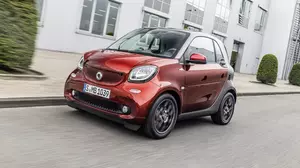
| Vehicle | Curb weight | Difference from world's smallest | Weight to power ratio | 0—60 mph acceleration ratio | Consumption ratio |
|---|---|---|---|---|---|
| 1.0 |
860 kg / 1896 lbs |
435 kg (959 lbs) heavier | 12 kg to 1 hp | 60 kg/s (132 lbs/s) |
210 kg/L (463 lbs/L) |
| 0.9 |
865 kg / 1907 lbs |
440 kg (970 lbs) heavier | 10 kg to 1 hp | 81 kg/s (179 lbs/s) |
211 kg/L (465 lbs/L) |
| Brabus 17.6 kWh |
925 kg / 2040 lbs |
500 kg (1103 lbs) heavier | 11 kg to 1 hp | 95 kg/s (209 lbs/s) | - |
| 17.6 kWh |
985 kg / 2172 lbs |
560 kg (1235 lbs) heavier | 12 kg to 1 hp | 90 kg/s (198 lbs/s) | - |
| Brabus 0.9 |
995 kg / 2194 lbs |
570 kg (1257 lbs) heavier | 9 kg to 1 hp | 111 kg/s (245 lbs/s) |
221 kg/L (487 lbs/L) |
| Vehicle | 1.0 |
|---|---|
| Curb weight |
860 kg / 1896 lbs |
| Difference from world's smallest | 435 kg (435 lbs) heavier |
| Weight to power ratio | 12 kg to 1 hp |
| 0—60 mph acceleration ratio | 60 kg/s (132 lbs/s) |
| Consumption ratio |
210 kg/L (463 lbs/L) |
| Vehicle | 0.9 |
| Curb weight |
865 kg / 1907 lbs |
| Difference from world's smallest | 440 kg (440 lbs) heavier |
| Weight to power ratio | 10 kg to 1 hp |
| 0—60 mph acceleration ratio | 81 kg/s (179 lbs/s) |
| Consumption ratio |
211 kg/L (465 lbs/L) |
| Vehicle | Brabus 17.6 kWh |
| Curb weight |
925 kg / 2040 lbs |
| Difference from world's smallest | 500 kg (500 lbs) heavier |
| Weight to power ratio | 11 kg to 1 hp |
| 0—60 mph acceleration ratio | 95 kg/s (209 lbs/s) |
| Consumption ratio | - |
| Vehicle | 17.6 kWh |
| Curb weight |
985 kg / 2172 lbs |
| Difference from world's smallest | 560 kg (560 lbs) heavier |
| Weight to power ratio | 12 kg to 1 hp |
| 0—60 mph acceleration ratio | 90 kg/s (198 lbs/s) |
| Consumption ratio | - |
| Vehicle | Brabus 0.9 |
| Curb weight |
995 kg / 2194 lbs |
| Difference from world's smallest | 570 kg (570 lbs) heavier |
| Weight to power ratio | 9 kg to 1 hp |
| 0—60 mph acceleration ratio | 111 kg/s (245 lbs/s) |
| Consumption ratio |
221 kg/L (487 lbs/L) |
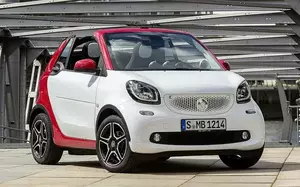
| Vehicle | Curb weight | Difference from world's smallest | Weight to power ratio | 0—60 mph acceleration ratio | Consumption ratio |
|---|---|---|---|---|---|
| 1.0 |
900 kg / 1985 lbs |
475 kg (1048 lbs) heavier | 13 kg to 1 hp | 61 kg/s (135 lbs/s) |
209 kg/L (461 lbs/L) |
| 17.6 kWh |
1015 kg / 2238 lbs |
590 kg (1301 lbs) heavier | 12 kg to 1 hp | 91 kg/s (201 lbs/s) | - |
| Brabus 17.6 kWh |
945 kg / 2084 lbs |
520 kg (1147 lbs) heavier | 12 kg to 1 hp | 97 kg/s (214 lbs/s) | - |
| 0.9 |
920 kg / 2029 lbs |
495 kg (1092 lbs) heavier | 10 kg to 1 hp | 86 kg/s (190 lbs/s) |
219 kg/L (483 lbs/L) |
| Brabus 0.9 |
1040 kg / 2293 lbs |
615 kg (1356 lbs) heavier | 10 kg to 1 hp | 116 kg/s (256 lbs/s) |
226 kg/L (498 lbs/L) |
| Vehicle | 1.0 |
|---|---|
| Curb weight |
900 kg / 1985 lbs |
| Difference from world's smallest | 475 kg (475 lbs) heavier |
| Weight to power ratio | 13 kg to 1 hp |
| 0—60 mph acceleration ratio | 61 kg/s (135 lbs/s) |
| Consumption ratio |
209 kg/L (461 lbs/L) |
| Vehicle | 17.6 kWh |
| Curb weight |
1015 kg / 2238 lbs |
| Difference from world's smallest | 590 kg (590 lbs) heavier |
| Weight to power ratio | 12 kg to 1 hp |
| 0—60 mph acceleration ratio | 91 kg/s (201 lbs/s) |
| Consumption ratio | - |
| Vehicle | Brabus 17.6 kWh |
| Curb weight |
945 kg / 2084 lbs |
| Difference from world's smallest | 520 kg (520 lbs) heavier |
| Weight to power ratio | 12 kg to 1 hp |
| 0—60 mph acceleration ratio | 97 kg/s (214 lbs/s) |
| Consumption ratio | - |
| Vehicle | 0.9 |
| Curb weight |
920 kg / 2029 lbs |
| Difference from world's smallest | 495 kg (495 lbs) heavier |
| Weight to power ratio | 10 kg to 1 hp |
| 0—60 mph acceleration ratio | 86 kg/s (190 lbs/s) |
| Consumption ratio |
219 kg/L (483 lbs/L) |
| Vehicle | Brabus 0.9 |
| Curb weight |
1040 kg / 2293 lbs |
| Difference from world's smallest | 615 kg (615 lbs) heavier |
| Weight to power ratio | 10 kg to 1 hp |
| 0—60 mph acceleration ratio | 116 kg/s (256 lbs/s) |
| Consumption ratio |
226 kg/L (498 lbs/L) |
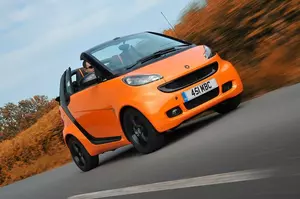
| Vehicle | Curb weight | Difference from world's smallest | Weight to power ratio | 0—60 mph acceleration ratio | Consumption ratio |
|---|---|---|---|---|---|
| 1.0i |
780 kg / 1720 lbs |
355 kg (783 lbs) heavier | 8 kg to 1 hp | 83 kg/s (183 lbs/s) |
150 kg/L (331 lbs/L) |
| 0.8d |
780 kg / 1720 lbs |
355 kg (783 lbs) heavier | 17 kg to 1 hp | - |
229 kg/L (505 lbs/L) |
| Vehicle | 1.0i |
|---|---|
| Curb weight |
780 kg / 1720 lbs |
| Difference from world's smallest | 355 kg (355 lbs) heavier |
| Weight to power ratio | 8 kg to 1 hp |
| 0—60 mph acceleration ratio | 83 kg/s (183 lbs/s) |
| Consumption ratio |
150 kg/L (331 lbs/L) |
| Vehicle | 0.8d |
| Curb weight |
780 kg / 1720 lbs |
| Difference from world's smallest | 355 kg (355 lbs) heavier |
| Weight to power ratio | 17 kg to 1 hp |
| 0—60 mph acceleration ratio | - |
| Consumption ratio |
229 kg/L (505 lbs/L) |
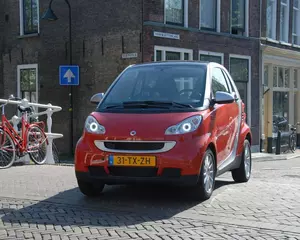
| Vehicle | Curb weight | Difference from world's smallest | Weight to power ratio | 0—60 mph acceleration ratio | Consumption ratio |
|---|---|---|---|---|---|
| 1.0i |
780 kg / 1720 lbs |
355 kg (783 lbs) heavier | 8 kg to 1 hp | 83 kg/s (183 lbs/s) |
150 kg/L (331 lbs/L) |
| 0.8 cdi |
780 kg / 1720 lbs |
355 kg (783 lbs) heavier | 17 kg to 1 hp | - |
236 kg/L (520 lbs/L) |
| Vehicle | 1.0i |
|---|---|
| Curb weight |
780 kg / 1720 lbs |
| Difference from world's smallest | 355 kg (355 lbs) heavier |
| Weight to power ratio | 8 kg to 1 hp |
| 0—60 mph acceleration ratio | 83 kg/s (183 lbs/s) |
| Consumption ratio |
150 kg/L (331 lbs/L) |
| Vehicle | 0.8 cdi |
| Curb weight |
780 kg / 1720 lbs |
| Difference from world's smallest | 355 kg (355 lbs) heavier |
| Weight to power ratio | 17 kg to 1 hp |
| 0—60 mph acceleration ratio | - |
| Consumption ratio |
236 kg/L (520 lbs/L) |
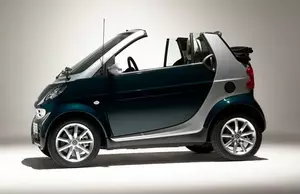
| Vehicle | Curb weight | Difference from world's smallest | Weight to power ratio | 0—60 mph acceleration ratio | Consumption ratio |
|---|---|---|---|---|---|
| 0.7 i |
805 kg / 1775 lbs |
380 kg (838 lbs) heavier | 13 kg to 1 hp | 55 kg/s (121 lbs/s) |
171 kg/L (377 lbs/L) |
| 0.7i Brabus |
805 kg / 1775 lbs |
380 kg (838 lbs) heavier | 11 kg to 1 hp | 69 kg/s (152 lbs/s) |
152 kg/L (335 lbs/L) |
| 0.8d |
805 kg / 1775 lbs |
380 kg (838 lbs) heavier | 20 kg to 1 hp | 43 kg/s (95 lbs/s) |
212 kg/L (467 lbs/L) |
| Vehicle | 0.7 i |
|---|---|
| Curb weight |
805 kg / 1775 lbs |
| Difference from world's smallest | 380 kg (380 lbs) heavier |
| Weight to power ratio | 13 kg to 1 hp |
| 0—60 mph acceleration ratio | 55 kg/s (121 lbs/s) |
| Consumption ratio |
171 kg/L (377 lbs/L) |
| Vehicle | 0.7i Brabus |
| Curb weight |
805 kg / 1775 lbs |
| Difference from world's smallest | 380 kg (380 lbs) heavier |
| Weight to power ratio | 11 kg to 1 hp |
| 0—60 mph acceleration ratio | 69 kg/s (152 lbs/s) |
| Consumption ratio |
152 kg/L (335 lbs/L) |
| Vehicle | 0.8d |
| Curb weight |
805 kg / 1775 lbs |
| Difference from world's smallest | 380 kg (380 lbs) heavier |
| Weight to power ratio | 20 kg to 1 hp |
| 0—60 mph acceleration ratio | 43 kg/s (95 lbs/s) |
| Consumption ratio |
212 kg/L (467 lbs/L) |
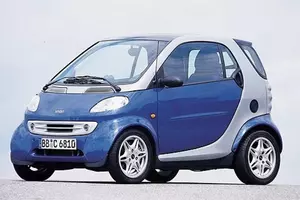
| Vehicle | Curb weight | Difference from world's smallest | Weight to power ratio | 0—60 mph acceleration ratio | Consumption ratio |
|---|---|---|---|---|---|
| 0.6i |
805 kg / 1775 lbs |
380 kg (838 lbs) heavier | 18 kg to 1 hp | - |
175 kg/L (386 lbs/L) |
| 0.7 i |
805 kg / 1775 lbs |
380 kg (838 lbs) heavier | 16 kg to 1 hp | 46 kg/s (101 lbs/s) |
171 kg/L (377 lbs/L) |
| 0.7i Brabus |
805 kg / 1775 lbs |
380 kg (838 lbs) heavier | 11 kg to 1 hp | 69 kg/s (152 lbs/s) |
152 kg/L (335 lbs/L) |
| 0.8d |
805 kg / 1775 lbs |
380 kg (838 lbs) heavier | 20 kg to 1 hp | 43 kg/s (95 lbs/s) |
212 kg/L (467 lbs/L) |
| Vehicle | 0.6i |
|---|---|
| Curb weight |
805 kg / 1775 lbs |
| Difference from world's smallest | 380 kg (380 lbs) heavier |
| Weight to power ratio | 18 kg to 1 hp |
| 0—60 mph acceleration ratio | - |
| Consumption ratio |
175 kg/L (386 lbs/L) |
| Vehicle | 0.7 i |
| Curb weight |
805 kg / 1775 lbs |
| Difference from world's smallest | 380 kg (380 lbs) heavier |
| Weight to power ratio | 16 kg to 1 hp |
| 0—60 mph acceleration ratio | 46 kg/s (101 lbs/s) |
| Consumption ratio |
171 kg/L (377 lbs/L) |
| Vehicle | 0.7i Brabus |
| Curb weight |
805 kg / 1775 lbs |
| Difference from world's smallest | 380 kg (380 lbs) heavier |
| Weight to power ratio | 11 kg to 1 hp |
| 0—60 mph acceleration ratio | 69 kg/s (152 lbs/s) |
| Consumption ratio |
152 kg/L (335 lbs/L) |
| Vehicle | 0.8d |
| Curb weight |
805 kg / 1775 lbs |
| Difference from world's smallest | 380 kg (380 lbs) heavier |
| Weight to power ratio | 20 kg to 1 hp |
| 0—60 mph acceleration ratio | 43 kg/s (95 lbs/s) |
| Consumption ratio |
212 kg/L (467 lbs/L) |